For years, the most well-researched members of the diet community have warned of the dangers of omega-6 polyunsaturated fatty acids (PUFAs) such as soybean oil, given their high propensity for inflammation, obesity, and disease. A six month, randomized controlled diet study run in China has given new evidence for those warnings, as a diet high in soybean oil significantly damaged the gut microbiome in participants.[1]
The soybean study scandal
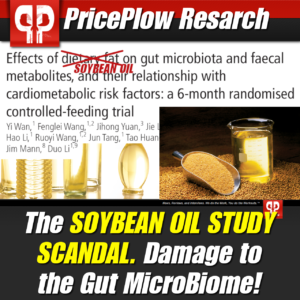
A new study has shown us that soybean oil is disastrous for the gut microbiome and slows weight loss. But that’s not exactly how they’re ‘selling’ it…
But the real story here is how the researchers and the media are twisting this study, attempting to use it as a reason to avoid high-fat diets. In reality, the data actually reinforces two major ideas we’ve been pushing:
- Soybean oil (and other related industrialized processed seed oils) are slow-acting poisons
- As long as protein is prioritized, both low-fat and low-carb diets are metabolically healthy, but the middle ground is where the real danger lies.
The study is titled “Effects of dietary fat on gut microbiota and faecal metabolites, and their relationship with cardiometabolic risk factors: a 6-month randomised controlled-feeding trial”, but as you’ll soon see, that is an extremely misleading title given the study’s “food” choices.
The study and its design
Behind spokesman Jim Mann of the University of Otago in New Zealand, the researchers wanted to determine what would happens when a low-fat, high-carb culture heavy in rice consumption such as China begins to increase dietary fat consumption as it becomes more “westernized”.
To model this, they took 217 healthy Chinese citizens and provided them with all of their food for six months, randomly splitting them into three isocaloric groups (ie they all received the same amount of calories):
- Lower-Fat Diet: 20% calories from fat, 66% calories from carbohydrates
- “Moderate-Fat Diet”: 30% calories from fat, 56% calories from carbohydrates
- “Higher-Fat Diet”: 40% calories from fat, 46% calories from carbohydrates
Fiber intake was held constant, and each group maintained 14% of energy from protein (offtopic, but I argue that this is 1% too low, and that 1% makes a major difference due to Protein Leverage,[2] a story for another day).
Data (and stool) collected before and after intervention
The researchers took fasted blood tests to measure lipid and metabolic biomarkers on top of measuring several inflammatory factors. Additionally, they collected stool samples at baseline and at the end of the six month intervention.
“Higher fat”… but does that mean high fat?
“Moderate-Fat” and “Higher-Fat” have been put into quotes because these are subjective terms. While 40% of calories from fat is indeed “higher” fat, it is not a high fat diet. This becomes an issue later, as the study’s results are already being used to attack high fat diets with erroneous headlines.
This is soybean oil, not “dietary fat”. There is a difference.
But the bigger issue at hand, which is covered in depth below, is that the higher amounts of fat came in the form of high amounts of soybean oil:
“We achieved the required macronutrient distribution in the three diet groups by replacing a proportion of energy derived from carbohydrate (mainly white rice and wheat flour, the most consumed carbohydrate sources in Asia) with fats (mainly soybean oil, the most widely used edible oil in Asia).”[1]
Given this statement, the study’s title is extremely misleading. What we’re really studying here is the result of adding a ton of soybean oil to a high-carb diet. This should not be confused with true dietary fat, which would come from actual food and animal sources (of which the Chinese eat plenty of).
Soybean oil and its dangers
As mentioned above, the researchers largely used soybean oil to increase fat calories.
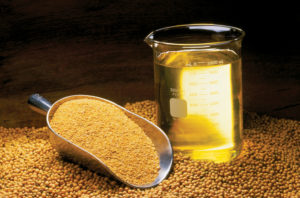
This is not a vegetable. And it’s loaded with unstable omega-6 polyunsaturated fatty acids that are terrible for heating/cooking! Image courtesy Wikimedia
Soybean oil is an industrialized processed seed oil derived from the seeds of soybeans, by solvent extracting them using hexanes. Erroneously referred to as a “vegetable oil,” it is often used as a cooking oil and is sometimes hydrogenated.
As the data below shows, soybean is an unstable and inflammatory substance, and oxidizes very easily when heated.
Soybean oil has long been known to be extremely pro-inflammatory and obesogenic. For instance, a 2011 study showed soybean oil disrupting several metabolic markers — especially blood pressure — when used for only 24 hours![3]
In 2012, research showed that diets high in omega-6 polyunsaturated fatty acids “could potentiate inflammatory processes and consequently predispose to or exacerbate many inflammatory diseases”, including chronic inflammatory diseases such as nonalcoholic fatty liver disease (NAFLD), cardiovascular disease, obesity, inflammatory bowel disease (IBD), rheumatoid arthritis, and Alzheimer’s disease (AD).[4]
A “cooking oil” that oxidizes when heated?!
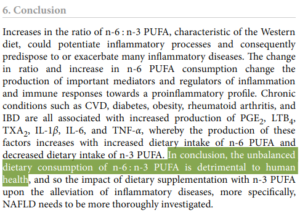
Eating this stuff (especially when heating it) is known to be extremely dangerous. So why would the researchers load participants up with as much as 24% of their diets with it?![4]
In general, increased omega-6 fatty acid intake correlates with increased risk of autoimmune disease,[5] much of this speculated to be due to their ability to easily oxidize[6] — especially when heated[7] — causing “deleterious health effects” such as increased cardiovascular disease risk.[6-8] Sadly, heating is exactly what happens with it, as it’s frequently used as a cooking oil!
Obesity in rats… worse than fructose!
Meanwhile, a more recent rat study showed that soybean oil is more obesogenic and causes more diabetes than giving coconut oil and fructose to the subjects![9,10] This was further demonstrated in 2017.[11]
This is nothing new: the mechanisms behind their inflammation have been discussed for over 15 years now.[12]
A broken oath
So right off the bat, the researchers committed a cardinal sin: “First, do no harm”. By subjecting two thirds of their participants to high doses of toxic soybean oil, they violate that very sacred oath.
Even scarier: The researchers knew of these dangers:
Worse, the researchers even discuss the above issues, stating that,
“It should be noted that the intake of polyunsaturated fatty acids (PUFAs) was relatively high in the higher-fat diet group (24% of total energy) owing to exclusive use of soybean oil, which is rich in n-6 PUFA. A higher intake of n-6 PUFA has been reported to have proinflammatory effects.”[1] [emphasis ours]
This leads us to wonder why and how they would consciously subject the participants to these dangers, having already understood the research. They knew exactly what they were doing here, and that makes for not only an obviously biased study, but an unethical one at that.
Unfortunately for the subjects (but perhaps for the greater good of the diet community) Jim Mann and the team of researchers knowingly sacrificed their gut health to inadvertently prove the very point we’ve all been trying to make for over a decade: soybean oil is toxic!
The data from the intervention gives very strong evidence that:
The results of the soybean oil study
First, the good news.
The “higher fat” group was definitely not a high-fat diet!
Of the subjects that completed the study, all groups lost weight. The lower-fat group lost more weight than the moderate-fat groups, and this is to be expected given the soybean oil research shown above and our theories behind “Autumnal eating.” This is a theory that considers the combination of high amounts of carbohydrates and fats to be more dangerous than one or the other eaten alone with protein, as discussed in an analysis of a 2018 study on the brain’s inability to properly value carb+fat combos and subject for a future post.
In addition, all groups had reductions in waist circumference and total cholesterol. This is generally expected when caloric intake is tightly controlled and the provided food is free!
Now, the bad news for the poor soybean oil groups:
Soybean oil diminishes fecal health
The “higher”, moderate fat diets had a significant decrease in Blautia and Faecalibacterium. Blautia is a group of bacteria containing various beneficial pro-acetate and pro-butyrate strains, and type-II diabetics are generally lower in them. Faecalibacterium is a well-known, important bacteria that is anti-inflammatory.

Healthy bacteria down, inflammatory bacteria up.[1] Would all dietary fats behave like this, though? We think not.
Simultaneously, the soybean group had an increase in the abundance of Alistipes and Bacteroides, the latter of which correlates with diminished lipid markers.
Soybean oil increases inflammation markers
Inflammation markers fared no better. The groups receiving greater amounts of soybean oil had decreased short-chain fatty acids such as butyric acid, a highly-beneficial compound.
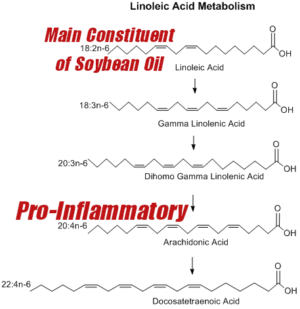
One example of how it happens. The main constituent breaks down into known inflammatory acids that general dieters do not need more of.
Worse, the soybean oil group saw several proinflammatory acids increased, such as arachidonic acid and palmitic acid.
Bear in mind that stool samples were only collected before and after the study, an admitted drawback, but the data makes sense with what we’d expect and seems sound. We’re reasonable and don’t expect subjects to provide stool samples on a frequent basis, after all!
All in all, the health of those receiving high amounts of soybean oil was worse than those lowest in soybean oil, although they still were able to lose weight and waist circumference… just in a far less healthy manner.
So what’s the real issue with this study, despite its unethical nature?
It’s the way it is already being portrayed in media:
Disinformation time. An attack on eating fat?
Those who adhere to actual low-carbohydrate diets (eg. less than 10% energy from carbohydrate) have seen this all before:
- The “higher fat” group was not a low carb diet, and more importantly,
- The “higher fat” group was definitely not a high-fat diet!
For humans, truly “high fat diets” are often characterized as ~67% or greater calories from fat, with the majority of the rest preferably going to protein and fibrous vegetables. This study was nowhere near that.
But that bit of information won’t stop the establishment media and processed food lobbies from using this as a basis for attacking low-carb diets (of course including but not limited to ketogenic diets).
For instance, one such press article is titled “Gut benefits of moving away from a high fat diet”, with a subtitle that a “High fat diet linked to unfavourable changes in gut bacteria and inflammatory triggers”.[13]
Yet this wasn’t a high fat diet!!
This study has nothing to do with high fat diets. There was no high fat diet tested in this study! Not even close.
Instead, what we saw was a toxic slurry of insulin-spiking carbohydrates alongside extraordinarily inflammatory processed soybean oil that no reasonable dietician would ever recommend.
Our knowledge of metabolic disorder supercedes that of the gut microbiome
On the topic of the microbiome, also remember that we know very little about it, and cannot even connect its status to mortality or cardiovascular disease. There has never been an intervention trial between the microbiome and cardiovascular disease nor cancer showing reduced rates. There has been for low-carb, high-fat interventions and diabetes — which is connected to both of those.
Researchers with clear bias
The researchers even show their bias, stating that,
“Compared with a lower fat diet, long-term consumption of a higher fat diet appears to be undesirable….for young healthy adults whose diet is in transition from the traditionally consumed lower fat, higher carbohydrate diet to one characterised by an appreciably higher fat content.”[13]
This is simultaneously right but wrong. It’s right in that adding soybean oil to nearly anything is a slow-rolling recipe for disaster. But it’s wrong that an “appreciably higher fat content” is undesirable, especially when using healthy fats and ditching the carbohydrates. If they want to make those claims, then they need to test those claims.
Meanwhile, Dave Feldman asks a great question: if you were trying to test a plant-based diet, and gave 24% of calories in the form of refined white flour, would you consider that a “fair trial”?
Listen to Jim Mann discuss this study
Researcher and co-author of the study, Jim Mann, went on Radio New Zealand to discuss his results and attempts to apply them to more Westernized cultures such as New Zealand.
You can listen for yourself, but we’ll leave the best reaction to George Henderson, who stated:
“Listening to this gives you a good idea of how willing the old guard are to misrepresent our diets in order to still be able to criticise them.It’s as if Mann’s a lawyer, not a doctor. He’s gone well beyond trying to convince the Chinese to cut back on Amazonian soybean oil.”
— George Henderson (@puddleg)[14]
Mann should do what he obviously knows is correct, and warn societies of this toxic oil – not of high fat diets. It’s indeed true that the Chinese are cooking with these tragic oils more each year. But don’t blame an entire category for what its criminally poisonous components are doing.
Propaganda set in motion
Regardless of the truth, the process has already begun. The initial headline has been written, and there’s almost nothing stopping the media from twisting this one into yet another crusade against a species-appropriate diet — which includes high amounts of fat and protein from animal sources.

We’ve seen disinformation before, and we’ll see it again. They really are pushing back hard, aren’t they? Why is that? What are they afraid of?
These people are sick, and they will stop at nothing to obfuscate the truth and confuse you in your quest for answers. Your health, vitality, and strength is not in the Big Food / Big Agra / Big Pharma establishment’s best interests.
Thankfully, we live in a world that is awakening. Distrust in “old guard” establishment news sources and researchers has never been lower, and their exposure has never been higher. The fight for that truth is happening in real-time on social media, and you have yourself a front row seat if you care to take it.
As mentioned in my take on the Jillian Michaels keto ordeal, this is an information war, and the establishment never knew how powerful the internet would become. Thanks to that (and our First Amendment rights), you can read posts like this one, which prove this type of research to not only be unethical, but downright harmful to anyone involved.
References
- Jim Mann, Yi Wan, Andrew Sinclair, et al; “Effects of dietary fat on gut microbiota and faecal metabolites, and their relationship with cardiometabolic risk factors: a 6-month randomised controlled-feeding trial”; Gut Microbiota; 0:1–13; February 19, 2019; https://gut.bmj.com/content/early/2019/01/18/gutjnl-2018-317609 (PDF at https://gut.bmj.com/content/gutjnl/early/2019/01/18/gutjnl-2018-317609.full.pdf)
- Simpson S, Raubenheimer, D; “Obesity: the protein leverage hypothesis”; Obesity Reviews; 6(2):133-42; May 2005; https://www.ncbi.nlm.nih.gov/pubmed/15836464 (Archive)
- Siqueira, Joselita et al; “Substitution of standard soybean oil with olive oil-based lipid emulsion in parenteral nutrition: comparison of vascular, metabolic, and inflammatory effects”; Journal of Clinical Endocrinology and Metabolism; vol. 96,10 (2011): 3207-16; https://www.ncbi.nlm.nih.gov/pmc/articles/PMC3200250/
- E. Patterson, R. Wall, G. F. Fitzgerald, R. P. Ross, and C. Stanton; “Health Implications of High Dietary Omega-6 Polyunsaturated Fatty Acids”; Journal of Nutrition and Metabolism; vol. 2012, Article ID 539426, 16 pages; 2012; https://www.hindawi.com/journals/jnme/2012/539426/
- Fernandes, G; “Dietary lipids and risk of autoimmune disease”; Clinical Immunology and Immunopathology; 72(2):193-7; August 1994; https://www.ncbi.nlm.nih.gov/pubmed/8050192
- Jaarin, Kamsiah et al; “The effects of heated vegetable oils on blood pressure in rats” Clinics (Sao Paulo, Brazil); vol. 66,12 (2011): 2125-32; https://www.ncbi.nlm.nih.gov/pmc/articles/PMC3226610/
- Ng, C, et al; “Heated vegetable oils and cardiovascular disease risk factors”; Vascular Pharmacology; 61(1):1-9; April 2014; https://www.ncbi.nlm.nih.gov/pubmed/24632108
- Perumalla Venkata, Rekhadevi and Rajagopal Subramanyam; “Evaluation of the deleterious health effects of consumption of repeatedly heated vegetable oil”; Toxicology Reports; vol. 3 636-643. 16 Aug. 2016; https://www.ncbi.nlm.nih.gov/pmc/articles/PMC5616019/
- Deol P, Evans JR, Dhahbi J, Chellappa K, Han DS, Spindler S, et al; “Soybean Oil Is More Obesogenic and Diabetogenic than Coconut Oil and Fructose in Mouse: Potential Role for the Liver”; PLoS ONE 10(7): e0132672; 2015; https://journals.plos.org/plosone/article?id=10.1371/journal.pone.0132672
- Science News; “Soybean oil causes more obesity than coconut oil, fructose”; July 22, 2015; https://www.sciencedaily.com/releases/2015/07/150722144640.htm
- Deol, P, et al; “Omega-6 and omega-3 oxylipins are implicated in soybean oil-induced obesity in mice”; Scientific Reports; volume 7, Article number: 12488; 2017; https://www.nature.com/articles/s41598-017-12624-9
- Bagga, Dilprit et al; “Differential effects of prostaglandin derived from omega-6 and omega-3 polyunsaturated fatty acids on COX-2 expression and IL-6 secretion”; Proceedings of the National Academy of Sciences of the United States of America; vol. 100,4 (2003): 1751-6; https://www.ncbi.nlm.nih.gov/pmc/articles/PMC149905/
- SciMex; “Gut benefits of moving away from a high fat diet”; February 20, 2019; https://www.scimex.org/newsfeed/benefits-of-moving-away-from-a-high-fat-diet
- Henderson, George; Twitter; February 19, 2019; https://twitter.com/puddleg/status/1098059996229562370
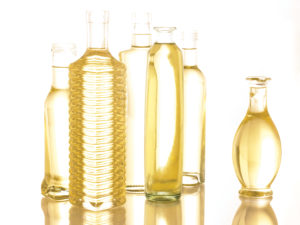
By Michele August 9, 2020 - 8:47 am
I believe my daughter got Crohns after a habit of eating Taco Bell on her way home from work. They use soybean oil. The pain and suffering was horrible. Now we use coconut oil and doing better.